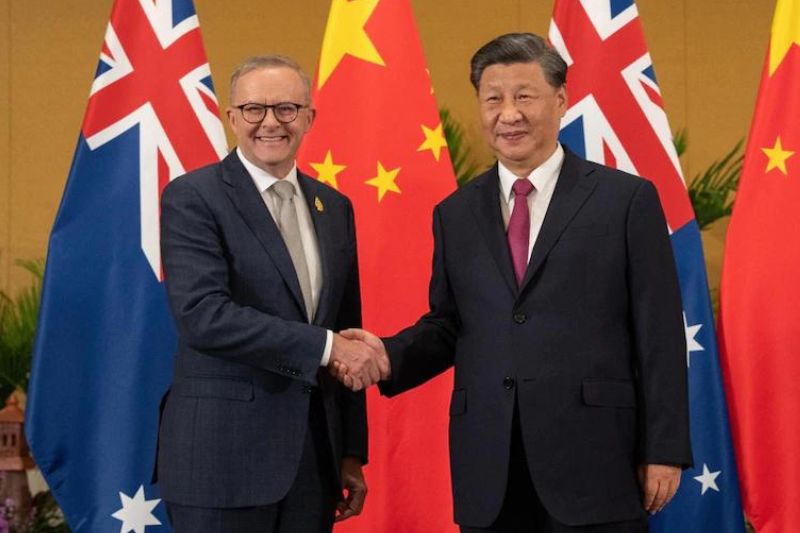Prime Minister Albanese’s recent high-level meetings covered multiple time zones and various climatic conditions, both diplomatic and otherwise. In both Washington, DC, and in Beijing, Albanese was given the red carpet treatment by Presidents Joe Biden and Xi Jinping. His trip to the Pacific Islands Forum Leaders’ Meeting in the Cook Islands was much more collegial and a reminder that while it is good to dine five star, its also worthwhile spending some time at the neighbours.

There was a US State Dinner in the Rose Garden and then a private Oval Office meeting. In China Albanese spoke at the Shanghai Trade Expo and later, in Beijing, had a private meeting with Xi and then a formal affair in the Great Hall of the People. Both Presidents spent as much time talking through Albanese as they did to him, as each sought to assert themself as Australia’s best friend. By all accounts Albanese did well, although it was not without some deft footwork on his own part, even before his Cook Islands mini jig.
In Washington, for instance, at the end of a welcome speech that traversed such topics as the Middle East, Ukraine and AUKUS, Biden pointedly referenced recent collisions between Filipino and Chinese vessels and stated, twice: ‘the United States’ defense agreement to the Philippines is ironclad. Any attack on Filipino aircraft, vessels, or armed forces will invoke our Mutual Defense Treaty with the Philippines.’ Two sentences later, he then invited Prime Minister Albanese to respond. It is a stretch to say that this Rose Garden press conference was Albanese channelling Love Actually’s Prime Minister David but thankfully, before the next stop in Shanghai, Albanese did carefully differentiate Australia’s place in the relationships, plural.
He did not expressly agree with Biden’s bellicosity but uttered his careful dictum that in terms of relating with China Australia would ‘co-operate where we can, and disagree where we must.’ It wasn’t a spit in the Presidential chowder but nor was it the expected supine moment. Biden clearly heard the nuance because he later quoted Ronald Reagan’s stance towards the former USSR when commenting on how Australia and Albanese should re-engage with China: ‘trust but verify’, he said, which of course doesn't sound like much trust at all.
Leaving the US relatively unscathed was a win for Albanese but the other legs still remained. The China visit was all the more significant given that for the previous seven years, no Australian Prime Minister had visited China, our largest two-way trading partner. Even the lowliest government minister could not speak with their Chinese counterpart.
Depending on one’s view, Australia’s isolation was either a successful standing up to China’s economic coercion or it was an own-goal which had placed our relationship in the deep freeze and in so doing, had badly damaged export sectors as diverse as barley, red meat and wine. Regardless of how the near-decade of prior government policy towards China is characterised, it is fair to say that the best thing going for Albanese on this visit was that he was not Scott Morrison.
‘Handsome boy’ is a twee literal translation of a widely used Chinese phrase describing a man as ‘cool’ or even quite simply ‘that bloke whose name we do not know but who seems ok’, a kind of benign ‘hey you’.
This natural advantage was one that the Chinese side emphasised, using diplomatic language that referenced friendship and not wolf-warrior belligerence. They have also rather pointedly agreed to a resumption of annual leader talks between Australia and China. In turn, Albanese likewise again showed a deft touch, picking up an Australian lobster at the Trade Expo (a product still under heavy Chinese tariffs) and talking up the quality of Australia’s wine when dining with President Xi. He also managed to avoid answering Australian journalists’ questions about trust and sidestepped appearing to look like a Chinese pawn.
One of the weirder moments on the China trip was also the most instructive.
Premier Li Qiang called Albanese ‘a handsome boy’, citing Chinese WeChat reactions to footage of Albanese’s visit, which in turn provoked much punditry from Australia’s journalists, with one even claiming this phrase would be weaponised during later parliamentary question times. This shows that after the years of isolation, all levels of the Australia-China relationship are going to have to work to get back up to speed, not just politicians but also especially journalists. This must start again with the basics of language.
‘Handsome boy’ is a twee literal translation of a widely used Chinese phrase describing a man as ‘cool’ or even quite simply ‘that bloke whose name we do not know but who seems ok’, a kind of benign ‘hey you’. When senior commentators over-analyse the use of this Chinese phrase it is clear that the Australia China relationship still has a way to go before ‘its all about the vibe’ again.
Dr Jeremy Clarke, PhD, is Director of Sino-Immersions Pty Ltd.
Main image: Anthony Albanese and Xi Jinping held talks on the sidelines of the G20 summit in Bali, 2022.(Twitter: Anthony Albanese)